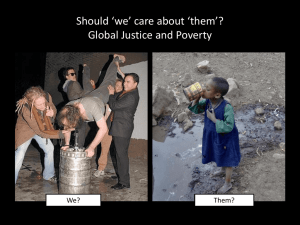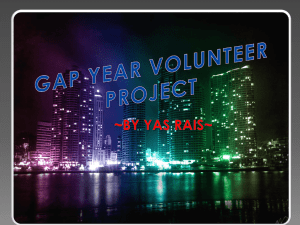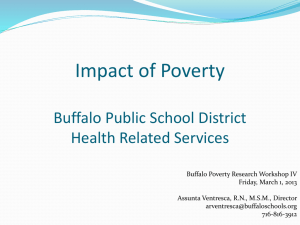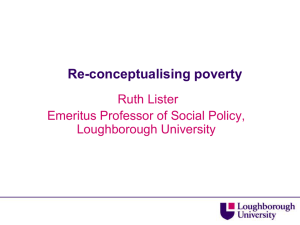Buckinghamshire Child Poverty Strategy 2011
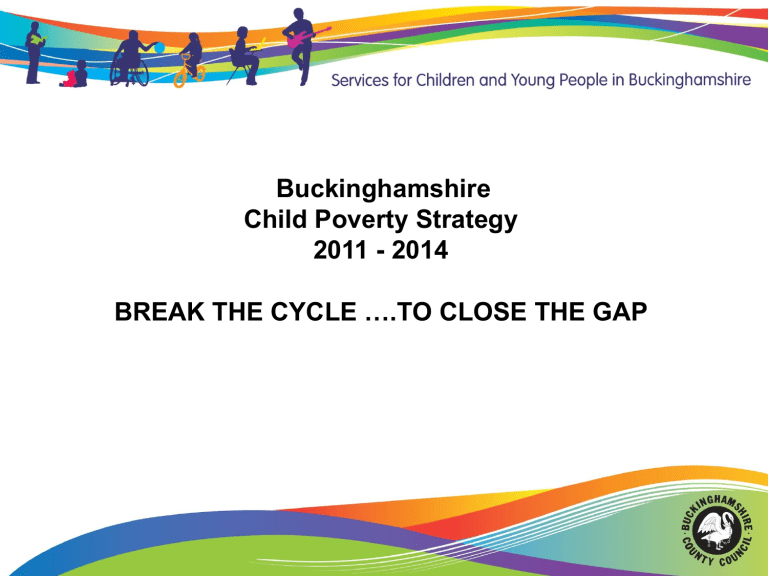
Buckinghamshire
Child Poverty Strategy
2011 - 2014
BREAK THE CYCLE ….TO CLOSE THE GAP
POVERTY in BUCKINGHAMSHIRE?
Some commonly used measures
• In 2008 there were 11,725 children aged 0 – 19 years living in poverty in
Buckinghamshire.
(source DWP National Indicator 116: number of children in families in receipt of either out of work benefits, or tax credits where their reported income is less than 60% of median income.)
• In 2007 8 communities or Lower Layer Super Output Areas (LLSOA) were in the 30% most deprived LLSOAs in England and they were within 4 wards. In
2010 this had risen to 12 communities within the following 8 wards:
Aylesbury: Coldharbour; Gatehouse; Quarrendon; Southcourt;
High Wycombe: Disraeli; Micklefield; Oakridge and Castlefield; Totteridge
(source: Indices of Multiple Deprivation data)
• Free School Meals at January 2011 there were 6.7% pupils in primary and
5.5% pupils in secondary schools eligible and claiming free school meals across Buckinghamshire.
Focus on Young People
• 1,615 18 –24 year olds claiming Job Seekers Allowance (JSA) in
Bucks, 26.9% of all JSA claimants. Since December 2010 claimants under 24 risen by 12.9%, compared to 3.9% rise for 25 –
49 year olds and 6.3% rise for over 50s. (source: JCP claimant counts for December 2011 analysed by BBF).
• Less unemployed young people than many other areas, but same issues - higher risk of long term unemployment; increasing competition with more experienced people; vacancies receding in sectors young people often look to e.g.1,235 JSA claimants (all ages) seeking work in sales and retail, up 335 on December 2010 and the highest figure recorded for any December.
(source: JCP claimant counts for November 2011 analysed by
BBF).
IMPACT of LIVING IN POVERTY
• In areas with a mix of income levels the gaps between those that have and those that have not, are clearly visible. These differences are felt by these children which impacts on their daily lives and diminishes aspirations.
• Children and young people in families on low incomes
are often less healthy
Have lower aspirations
Attend fewer social and educational activities
Are more frequently victims of bullying than their peers from higher income families.
RAISING THE PROFILE
Child Poverty Act 2010
Needs Assessment
– completed autumn 2010
Child Poverty Strategy
– published summer 2011
The Buckinghamshire Child Poverty Group - meets quarterly to assess what has had impact and keep a focus on achieving outcomes; Group members as Sponsors - work within and across the Strategy Priorities to help organisations incorporate tackling child poverty into their core business;
The Child Poverty Programme Manager (Programmes Team CYPT Delivery Unit) co-ordinates activity under the Strategy and works with the Local CYPT Partnership
Boards and other Strategic Partnerships to make links between the Child Poverty
Strategy activities and their priorities.
Local Area Forums - play a key role by increasing local awareness about child poverty in Buckinghamshire, incorporating activities that benefit low income families in their area into their own priorities and plans and providing funding where appropriate.
Informing the public – press releases; local radio items; regular updates to CYPT partner organisations; ‘slots’ on Swan Vision Screens in BCC offices and libraries. .
Member engagement – through CYPT Board and lead member for Skills Development on Child Poverty Group.
BUCKINGHAMSHIRE CHILD POVERTY STRATEGY
Our Vision - work together to contribute to breaking the cycle of inter
– generational poverty so that the gap in educational, physical and emotional achievement is narrowed between better and less well off families.
Priority A: Increase parental employment among families in poverty, particularly lone parents, those with health issues and those from minority ethnic groups and maximize their incomes.
Priority B: Reduce the health and housing inequalities of families in poverty.
Priority D: Improve career advice and opportunities for children and young people in poverty.
Priority C: Build community resilience.
Activities under the Strategy
Loan Sharks Practitioner Information Events
Definition: Someone who lends money as a business (to two or more people) without having the necessary Licence issued by the
Office of Fair Trading.
Characteristics:
• No credit agreements, receipts or payment books “you owe me this much today”;
• Repayments excessive with very high charges for defaulting.
• Violence or intimidation (or threats) if repayments are missed;
• Lend to young people (under 18’s);
Some successes by the IMLT:
• Seized and confiscated 1.3 million pounds cash
• Helped 16,000 victims
• Written off 40 million pounds illegal debt
• Prosecuted and secured custodial sentences amounting to 119 years
Activities under the Strategy
Loan Sharks Practitioner Information Events
Research findings 2006 and 2010 commissioned by ILMT:
• est.165,000 UK households use illegal money lenders, equating to
6% households in most deprived areas;
• £120m per year paid to illegal money lenders;
• victims most likely female, aged 30-40, on benefits, in social housing;
• 9% Social Fund users (now crisis loans) use Illegal Money Lenders;
• 7/10 people unwilling to report illegal money lenders cited “too dangerous” as the main reason;
• 54% residents of deprived estates are aware of illegal money lending in their own community;
• 63% victims agree payments to the lender must be top priority and most have problems paying for essentials like food, fuel and rent;
• 25% face debt/stress related physical or mental health problems.
Activities under the Strategy
• Follow on Loan sharks Events – informed public about loan sharks at two community health fairs; Chiltern District Council and partners planning community event in a school and further training for community safety and revenues and benefits staff, CAB volunteers and those involved with developing credit unions;
• ‘Child poverty’ page on CYPT website and ‘Family Finance’ page on
Buckinghamshire Family Information Service website - money saving ideas; help for people struggling with fuel bills; iinformation on home improvement grants for home owners and privately renting tenants.
• Emerging ideas from attending LAFs and Strategic Partnerships include publicising the Buckinghamshire Family Information Service to parish councils and residents through local magazines and through Thames Valley Police information networks;
• Exploring with Housing Associations, District Councils and other partners options to secure recently announced funding from the Job
Centre Plus to help their customers into work;
Activities under the Strategy
• Through the NHS Bucks representative on the Child Poverty
Group linking with review of midwifery and health visitor services to help target services on disadvantaged communities;
• Working with partners to develop early education provision for very young children in readiness for additional future
Government funding for such places;
• Met with Housing Officers working in the private rented sector and as a result we are asking practitioners and others to tell them about poor quality private rented housing so they can help tenants;
• District Councils mapping what they and their partners already do that supports the Strategy objectives and working with Child
Poverty Programme Manager to plan what more can be done in future.
Activities under the Strategy
• Looking at opportunities through Youth Service Mobile bus to support young people in isolated or deprived communities who have problems accessing work and local services.
• Project X - a Targeted Youth Service project (Spring 2012) for a small group of referred young people, particularly at risk of missing out on educational and work opportunities, who will be helped to develop the skills they will need to succeed in the workplace.
• A Task and Finish group under the Chiltern and South Bucks
Local Partnership Board is developing partnerships in the
Chesham area to help young people into training and work, for example increased provision of work experience placements.
• A project (summer 2012) involving schools, Local Area Forums and the Peter Jones Enterprise Foundation is being planned to help year 10 students develop skills to make the best use of training and work opportunities and develop entrepreneurship.
Contacts and Further Information
• The Children and Young People’s Trust website Child Poverty page http://www.buckinghamshirepartnership.co.uk/partnership/CYPT/Child+Poverty.page
• Pam Curtis Child Poverty Programme Manager, Buckinghamshire County
Council
– Email: pcurtis@buckscc.gov.uk
– Tel: 01296 382955 Mobile: 07747768905
• Information to support individuals and families including those on low incomes is available on the Buckinghamshire Family Information Service (BFIS) website.
http://www.bucksfamilyinfo.org/kb5/buckinghamshire/fsd/home.page
• For people worried about loan sharks, contact the Illegal Money Lending Team via their website reportaloanshark@stoploansharks.gov.uk




